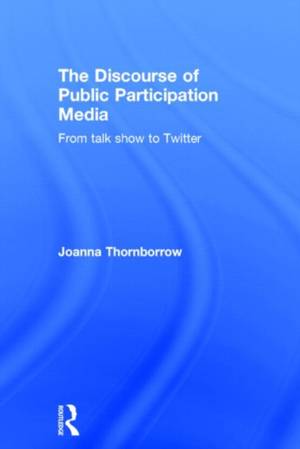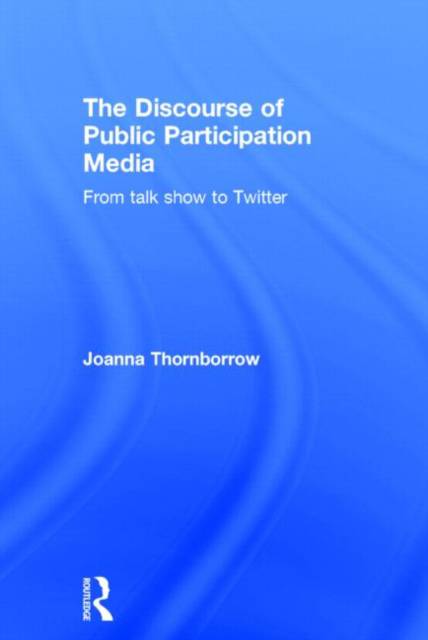
- Afhalen na 1 uur in een winkel met voorraad
- Gratis thuislevering in België vanaf € 30
- Ruim aanbod met 7 miljoen producten
- Afhalen na 1 uur in een winkel met voorraad
- Gratis thuislevering in België vanaf € 30
- Ruim aanbod met 7 miljoen producten
The Discourse of Public Participation Media
From Talk Show to Twitter
Joanna ThornborrowOmschrijving
The Discourse of Public Participation Media takes a fresh look at what 'ordinary' people are doing on air - what they say, and how and where they get to say it.
Using techniques of discourse analysis to explore the construction of participant identities in a range of different public participation genres, Joanna Thornborrow argues that the role of the 'ordinary' person in these media environments is frequently anything but.
Tracing the development of discourses of public participation media, the book focusses particularly on the 1990s onwards when broadcasting was expanding rapidly: the rise of the TV talk show, increasing formats for public participation in broadcast debate and discussion, and the explosion of reality TV in the first decade of the 21st century. During this period, traditional broadcasting has also had to move with the times and incorporate mobile and web-based communication technologies as new platforms for public access and participation - text and email as well as the telephone - and an audience that moves out of the studio and into the online spaces of chat rooms, comment forums and the 'twitterverse'.
This original study examines the shifting discourses of public engagement and participation resulting from these new forms of communication, making it an ideal companion for students of communication, media and cultural studies, media discourse, broadcast talk and social interaction.
Specificaties
Betrokkenen
- Auteur(s):
- Uitgeverij:
Inhoud
- Aantal bladzijden:
- 210
- Taal:
- Engels
Eigenschappen
- Productcode (EAN):
- 9781138024946
- Verschijningsdatum:
- 27/11/2014
- Uitvoering:
- Hardcover
- Formaat:
- Genaaid
- Afmetingen:
- 155 mm x 229 mm
- Gewicht:
- 430 g

Alleen bij Standaard Boekhandel
Beoordelingen
We publiceren alleen reviews die voldoen aan de voorwaarden voor reviews. Bekijk onze voorwaarden voor reviews.











